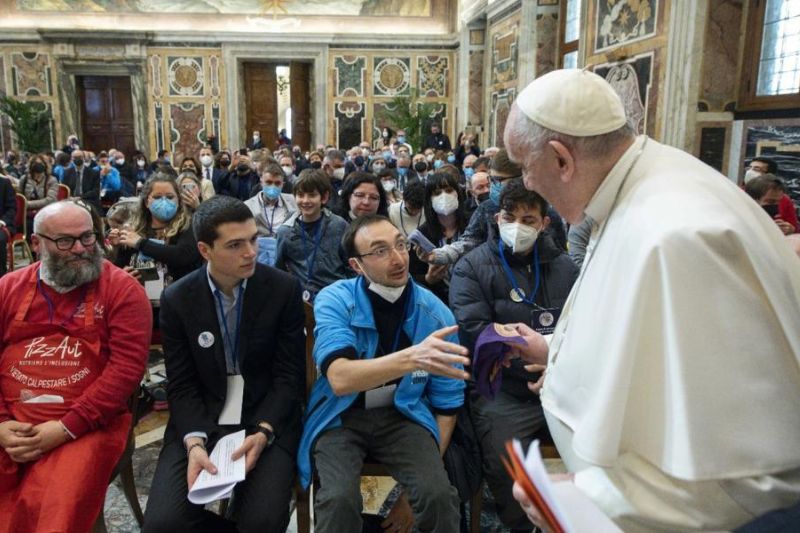The final document of the Synod on Synodality has served as a signpost to a quiet revolution in many areas. Not least of these has been the Church’s attitude to disability. As I have discussed in detail elsewhere, until Pope Francis’ pontificate, this had hovered uneasily between writing disability off as a legacy of original sin (suggesting that baptism wasn’t terribly useful!) and regarding disabled people as ‘victim souls’, privileged to suffer.

While Francis has previously spoken of the ‘magisterium of frailty’, noting that the weakness attendant on age opens us to the realisation that all of us are limited, the Synod goes much further. Having noted (in paragraph 54), society’s history of discrimination against disabled people, paragraph 63 states that:
63. In promoting co-responsibility for the mission of all the baptised, we recognise the apostolic capacities of people with disabilities who feel called and sent out as active agents of evangelisation. We appreciate the contribution that comes from the immense wealth of humanity they bring with them. We acknowledge their experiences of suffering, marginalisation, and discrimination, sometimes suffered even within the Christian community itself due to attempts at showing compassion that can be paternalistic. In order to encourage their participation in the life and mission of the Church, we propose the establishment of a Church-based research centre on disability.
While it is couched in fairly subdued terms, it is revolutionary for all that. Gone is the language of disability as either grace or sin, replaced by an acknowledgment that we, as disabled people, are not mere objects of charity or by-products of original sin but are equal in dignity and status with the rest of the baptised. As such, we both bring a wealth of experience to the conversation and have both the right and duty to participate in the Church as active members and agents of its mission.
In addition, the Synod notes that we bring a history of suffering – not by virtue of our impairments as such, but rather because of the response of society (including the Church) to who we are. In short, it aligns itself much more closely with the social view of disability (that it results from exclusion by society) than with the older medical view (that it is purely a problem of the individual, to be dealt with as such).
'We have the opportunity to draw on the good work being done by such organisations as the Church to acknowledge the faults of the past and make the creation of a world without barriers a reality. In doing so, however, we inevitably highlight the gap – whether in Church, state or civil society – between the rhetoric of inclusion and the reality of exclusion.'
Further, and for the first time ever, it recommends that there be a body in and of the Catholic Church itself, which looks to research the status of disabled people and foster the participation of disabled persons as equals within the life and ministry of the Church. In short, the Synod argues for a church of ‘us’, rather than ‘us’ and ‘them’ (who may – or may not – be ‘included’ as objects of charity).
The Synod’s message is a timely one. While the rhetoric of ‘inclusion’ is everywhere on this day of people with disability, most of us with lived experience of disability know that the reality is rather different. From the deliberate depriorisation of disabled people for the Covid-19 vaccine to the refusal by state governments to introduce accessible public transport as mandated by Federal law, to the social changes wrought by cuts to the NDIS (supported by a range of parties including Labor, Liberal, and Pauline Hanson’s One Nation), most of us know that we are not high on society’s priority list.
This International Day of Disabled People therefore marks an opportunity, once again, to take stock of where we are and, in particular, to see how the stories we tell ourselves about who we are as a society (whether as Church, state or otherwise) stack up against the reality of how that society actually functions.
On it, we have the opportunity to draw on the good work being done by such organisations as the Church to acknowledge the faults of the past and make the creation of a world without barriers a reality. In doing so, however, we inevitably highlight the gap – whether in Church, state or civil society – between the rhetoric of inclusion and the reality of exclusion. It is therefore a twofold invitation. On the one hand, we are invited to gratitude for the notable steps which have been taken – especially, this year, by the Synod. On the other, however, we are invited to repentance for a reality which falls far short of the rhetoric and spurred to generosity in working to bridge the chasm.
Fr Justin Glyn SJ, General Counsel of the Australian Province, was appointed by Pope Francis as consultor to the Dicastery of Laity, Family and Life.
Main image: Vatican media